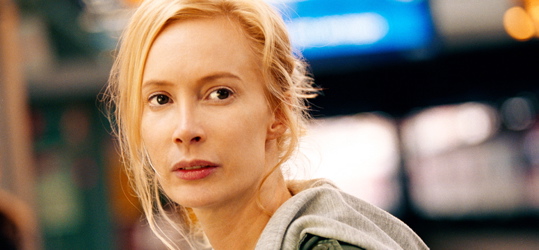By Ray Bennett
BERLIN – A battered wife leaves her husband and takes her son back home but their reception is not at all what she expected in Feo Aladag’s “When We Leave”, a well-crafted examination of the blindness of hidebound tradition.
Told calmly but with an escalating sense of dread, the story tackles a conflict that arises in many countries when modern thinking clashes with the strict patriarchal rules of ancient cultures. It’s a universal story that will connect with audiences familiar with the struggle of expatriate families to hold on to their sense of community while their daughters aspire to independence.
Angry but clear-eyed, the film should do well at home and find a sympathetic welcome in international markets and on the festival circuit.
In an engaging performance that requires grace, thoughtfulness and outbursts of rage, Sibel Kekilli plays Umay, a young woman from a Turkish family in Germany who has married a Turkish man and gone to live in Istanbul. Having had a secret abortion because she can no longer bear her husband’s mistreatment, she takes her infant son Cem (Nizam Schiller) and goes home to Berlin.
Although she explains the terror of her marriage, her working class father (Settar Tanriogen) and older brother Mehmet (Tamer Yigit) insist that she must return to her husband. Even her mother (Dertya Alabora) and younger siblings tell her she’s wrong. Umay sets about establishing a new life but the perils of going against entrenched attitudes that are more ingrained that familial love soon become horrifyingly apparent.
Aladag’s sympathy is clearly with the young woman but he does not demonize her family although Yigit is allowed to froth at the mouth a bit as her pigheaded thug of an older brother. As the confused and worried parents, Tanriogen and Alabora aptly convey the sternness required of their traditions and the inner turmoil that results from living in a world they don’t understand.
Scenes between Umay and her son are managed with considerable authority so that their relationship grows increasingly meaningful as the festering hypocrisy of pious morality becomes ever more menacing and leads to a shattering outcome.
Venue: Berlin International Film Festival — Panorama; Sales: Majestic; Production company: Independent Artists Filmproduktion; Cast: Sibel Kekilli, Nizam Schiller, Settar Tanriogen, Tamer Yigit, Dertya Alabora; Director, screenwriter, producer: Feo Aladag; Producer: Zuli Aladag; Director of photography: Judith Kaufmann; Production designer: Silke Buhr; Music: Max Richter, Stephane Moucha; Costume designer: Gioia Raspé; Editor: Andrea Martens; Not rated, 119 minutes.
This review appeared in The Hollywood Reporter.

